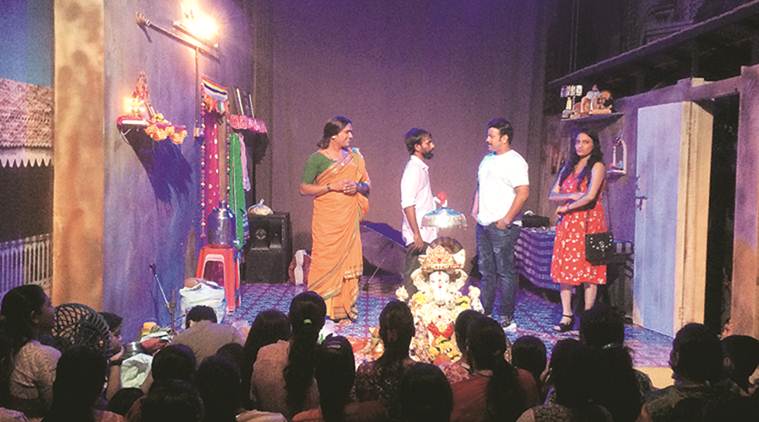Every day, the mandal attracts more than 2,500 people. Those wanting to see the Ganesha idol have to wait till the end of the play for the curtains to unfurl.
It is 8.30 pm when the aarti at J B Nagar Ganpati mandal in Andheri (East) ends. A crowd of over 50 stands in anticipation as the lights dim and a transgender takes the stage. For the next 10 minutes, a small play takes them through the challenges faced by the third gender community. Since 1976, when the Riddhi Siddhi Ganpati mandal was first set up, every year the local residents bring together a skit to raise awareness.
Last year, the mandal knit a skit to showcase the woes of using Mumbai’s roads that are ridden with potholes. Every day, the mandal attracts more than 2,500 people. Those wanting to see the Ganesha idol have to wait till the end of the play for the curtains to unfurl. The mandal stages 15 shows daily between 6 pm and 11 pm.
“The rains have affected the daily footfall. Ideally, on a weekend we are supposed to get long queues,” says Dinesh Chindarkar, who has written the script for the transgender skit.
The play is inspired by real life experiences of Mumbai-based transgender and activist Gauri Sawant. “We were sitting by the tea stall when we saw two transgenders nearby. When we saw their condition, we realised we need to do something for them,” says Kiran Patel, one of the organisers.
Chindarkar and Bharat Patel, the co-writer, spent hours talking to transgenders. They consulted on the script with LGBTQI (lesbian, gay, bisexual, transgender, queer, intersex) member Zameer Kamble, a professor at Savitribai Phule Pune University.
Sonali Chaukekar, a transgender, who moved to Mumbai from Konkan region after facing discrimination, says several Ganpati mandals are not as welcoming towards her community. “This is the first time a mandal has a dedicated theme for us. Even we love celebrating Ganesh utsav,” she says.
The play is about a couple, played by Suhas Lakhan and Chandraka Gade, who are stranded in heavy rain and seek shelter at a stranger’s home. They soon realise their host is, in fact, a transgender. This makes the couple uncomfortable but amidst punchlines that evoke a round of laughter, the transgender, played by Nitin Jadhav, describes the discrimination often faced by her community. In the play, she was forced to quit education after Class XII and her adopted son, played by Sushil Pawar, is a graduate struggling to find a job.
The play ends with the transgender’s powerful line, ‘We are transgenders by birth, not by choice’. Jadhav says he visited several transgenders in his area to understand their education and employment issues. For Lakhan, the play shattered his “keep-a-safe-distance-from-transgenders” belief.
“This festival is the right platform to raise awareness about such issues. Ganpati mandals attract a diverse crowd. There are senior citizens and kids, although they may get uncomfortable with the theme they need to understand this issue,” Himika Elwadhi says.
Class X student Prithvi Purohit says his perception that transgenders “curse” people has changed. His friend Karandeep Singh says, “We stereotype them without understanding, we are violating their rights by discriminating against them.”
The mandal takes the audience through the lives of famous personalities from the transgender community, including Manabi Bandyopadhyay, the first transgender college principal, and the first transgender Lok Adalat judge Joyita Mondal.
Madhu Singh visits the mandal daily. “There are several mandals I visit each year. But this one remains a favourite because there is a strong social message attached every year.” A few years ago, she adds, a skit on women empowerment was also crafted by the mandal.
Source: Read Full Article


